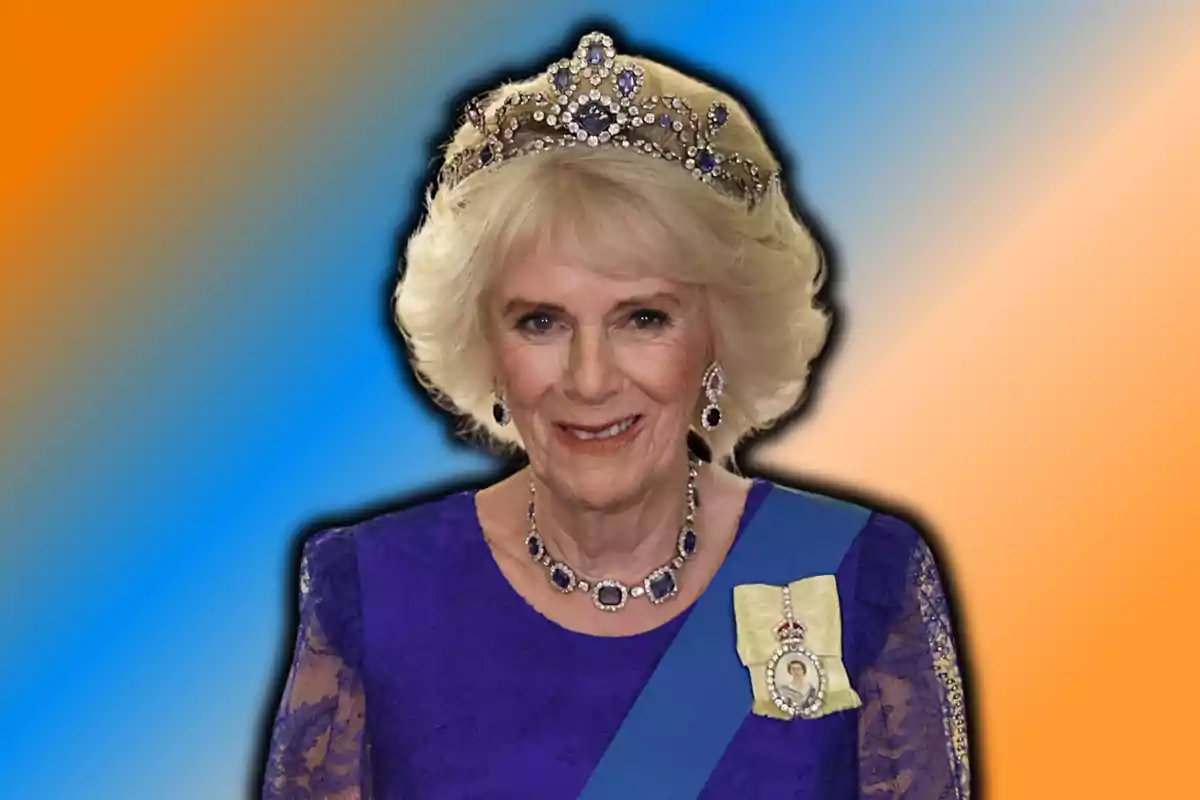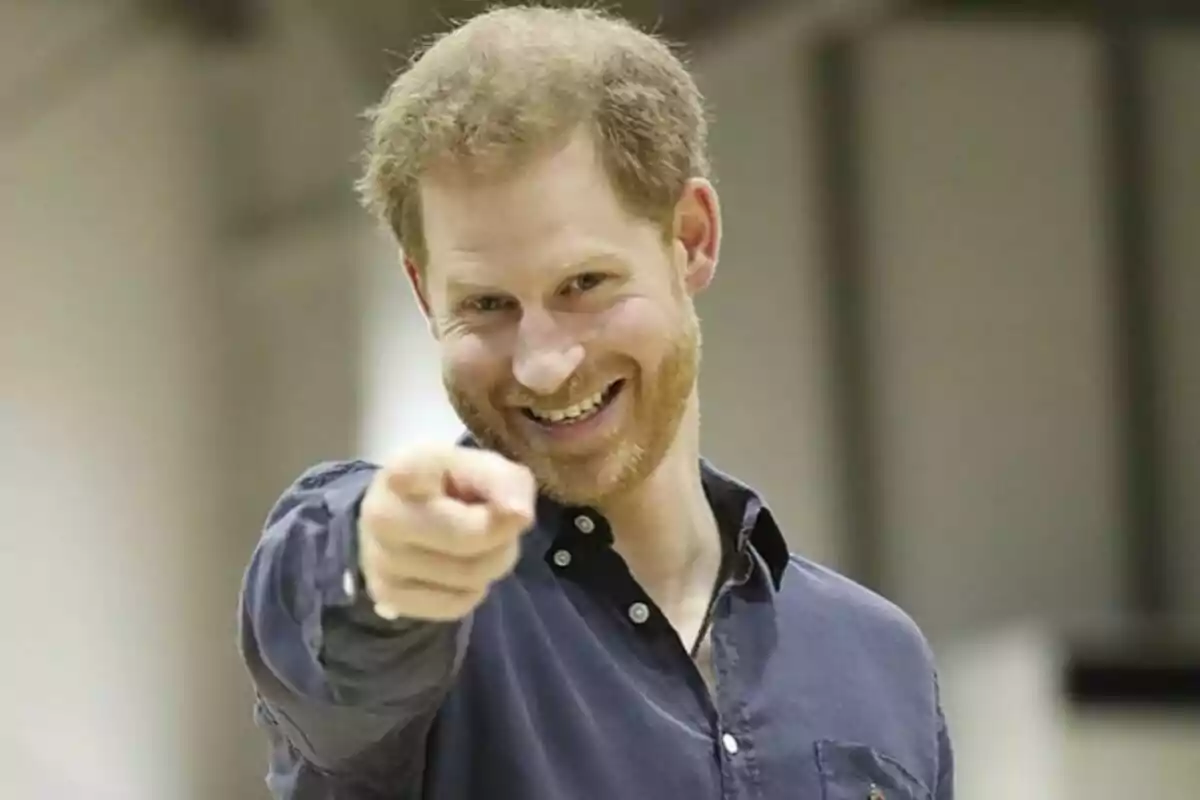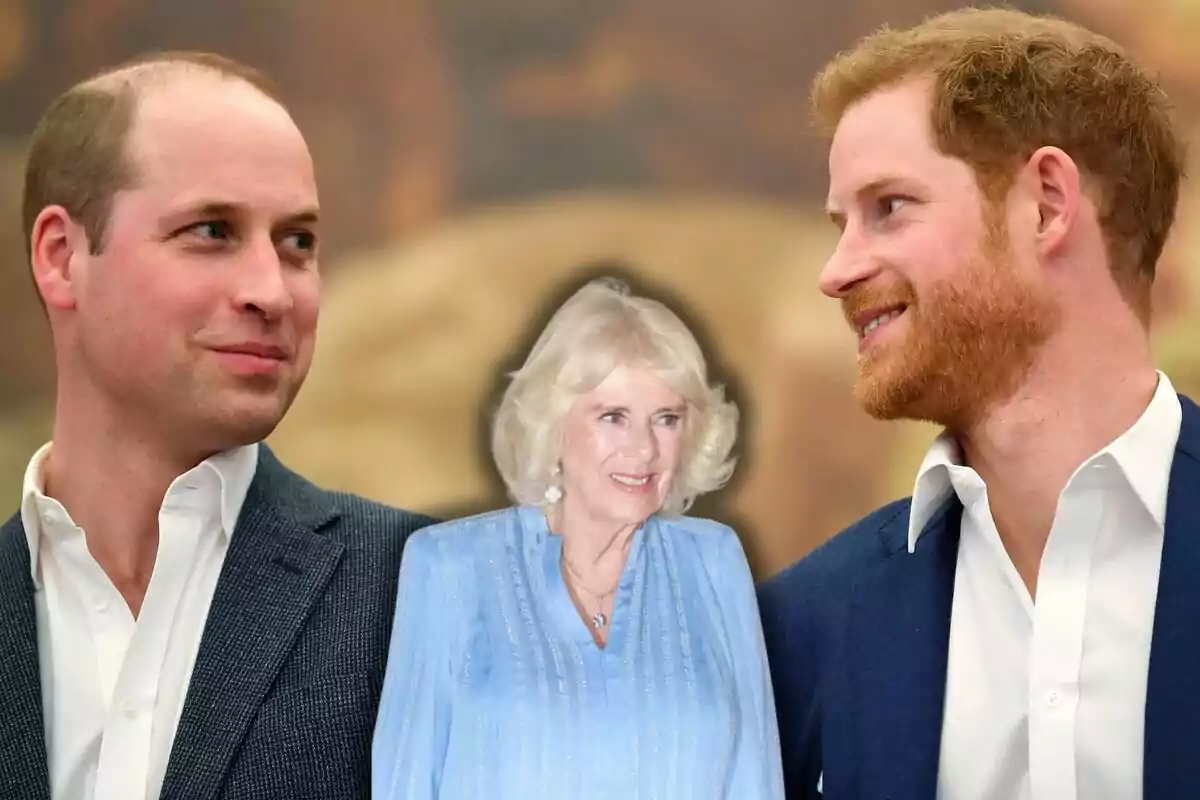At the epicenter of the British monarchy, a whirlwind where ancient tradition and modern storms collide with a crash, a silent battle is being waged, almost imperceptible to the untrained eye. Behind the imposing walls of Buckingham Palace, whispers in the corridors carry more weight and truth than official statements.
The delicate health of King Charles III, diagnosed with cancer at the beginning of this year, has not only plunged the nation into understandable anxiety, but has also served as a somber backdrop for a family drama that threatens to redefine the very future of the House of Windsor.
On this intricate chessboard, where every move is scrutinized and every word can be a weapon, the figure of Queen Camilla emerges with growing influence, a player whose maneuvers could ultimately prove decisive. The question hanging in the charged London air is whether her hand is behind Prince Harry's increasing isolation and the crucial decisions looming over his inheritance.
The King's illness, beyond the personal tragedy it represents, acts as an unexpected catalyst, accelerating tensions and forcing the hand in long-postponed matters. The uncertainty about his prognosis, fueled by comments attributed to Harry himself about not knowing "how much longer my father has to live," has created an atmosphere of urgency, real or perceived, to solve thorny issues such as succession and, crucially, the distribution of the monarch's private estate.
It is in this context of vulnerability and haste that internal power dynamics are exacerbated, and where some see the opportunity for different factions to push their agendas. Information resonating in circles close to the Crown suggests that Queen Camilla may be taking advantage of this situation to exert a decisive influence on the King's will, a document that could seal the fate of the prodigal younger son. Thus, Charles III's illness not only generates concern for his well-being, but also seems to have ignited the fuse of latent conflicts, becoming the engine of strategic moves revolving around power, legacy, and, of course, fortune.
The origin of the storm
The most recent tempest in the already turbulent waters of the relationship between Prince Harry and the Royal Family broke out in May 2025, after an explosive interview given to the BBC. In it, the Duke of Sussex not only reiterated his desire for reconciliation, but also made comments that shook the foundations of royal discretion. With a frankness that many considered reckless, Harry stated: "Life is precious. I don't know how much longer my father has."

He also added that King Charles III "doesn't speak to me because of this security issue," referring to his prolonged and publicized legal battle to keep taxpayer-funded police protection during his visits to the United Kingdom.
These statements, far from paving the way toward the desired reconciliation that the prince claims to seek, were met with a mixture of dismay and indignation in palace circles and among royal observers. Commentators and sources close to the Crown were quick to label his words as "unhelpful" and "confusing," especially sensitive given the cancer treatment the monarch is undergoing. Alisa Anderson, who was press secretary to Queen Elizabeth II, openly criticized the inappropriateness of Harry's comments. Some family friends went even further, calling the statements "disgusting" and the prince's behavior "unforgivable."
It is crucial to understand that this interview doesn't arise in a vacuum. It is, rather, the latest and resounding chapter in a saga of public disagreements that has kept the world's public opinion on edge. The publication of his memoir, "Spare," in 2023, had already caused an earthquake, with Harry airing grievances and launching harsh criticism against several family members, including his stepmother, Queen Camilla, whom he described in unflattering terms. This pattern of behavior raises questions about the strategy, or lack thereof, on the part of the Duke.
There is an apparent contradiction between his stated desire to build bridges and his recurring tendency to use media platforms to air intimate and often damaging details about the institution and its members. These revelations are interpreted, almost unanimously within palace walls, as acts of disloyalty that erode trust, an essential pillar for any genuine attempt at reconciliation. It seems that Harry's actions, far from bringing him closer to his goal, move him further away, suggesting a possible underestimation of the impact of his words on an institution so sensitive to public image.
Harry's insistence that the dispute over his security is the cause of his father's silence also deserves deeper analysis. While Buckingham Palace has limited itself to pointing out that the courts have thoroughly examined this matter, the question remains whether this is the real core of the problem or a convenient pretext. Is security the current apple of discord, or does it mask much deeper wounds related to broken trust and the bitter revelations of the past? If it is the former, the solution could be pragmatic. If it is the latter, the conflict is much more complex and deep-rooted, and the security issue would be nothing more than a symptom of a family fracture with unpredictable consequences.
Queen Camilla: shadow strategist or distant peacemaker?
At the center of this complex family plot, the figure of Queen Camilla stands with ever-increasing prominence. According to sources cited in the initial reference information, Camilla Parker Bowles would not be a mere spectator, but the "true strategist" of a silent yet devastating operation. It is alleged that she is taking advantage of the conflict between Charles III and his younger son to directly influence the monarch's will, with the aim of securing the future of her own children, Tom Parker Bowles and Laura Lopes, and, incidentally, locking the doors of the royal estate to the Duke of Sussex. These sources suggest that Camilla may have encouraged Charles to reconsider the legacy intended for Harry, arguing that his "constant slights" deserve neither forgiveness nor reward.
However, this image of a relentless and calculating Camilla contrasts notably with other reports that paint a different picture. Media outlets such as People and InStyle, citing close sources, claim that the Queen "stays out of it" regarding the painful dispute between the King and Prince Harry, as well as the equally tense relationship between Harry and his brother, Prince William. This apparent neutrality, however, doesn't erase the complicated history that binds Camilla and Harry.
The prince's memoir, "Spare," is an eloquent testament to this tension. In it, Harry doesn't hold back, describing his stepmother as "dangerous" and "the villain," and even accusing her of having leaked stories about him to the press in a calculated effort to rehabilitate her own image, long tarnished by her role in the breakup of Charles and Diana's marriage. It is also recalled how, years ago, both Harry and William reportedly begged their father not to marry Camilla. More recently, reports have circulated, though of a more sensationalist nature and attributed to the National Enquirer, about an alleged direct confrontation during a brief visit by Harry to the ailing King, where Camilla is said to have urged him to leave, declaring that "he was not wanted back."
Regardless of her direct involvement in the current crisis, Camilla's rise in power and influence is undeniable, especially since she became Queen Consort and in light of the King's illness. Her nickname among the Clarence House staff, "the Lady Boss," could be interpreted as an indication of her firmness and commitment to the institution, or perhaps of a new assertiveness. This ambiguity about her true role—relentless strategist or discreetly influential figure who keeps publicly out of it?—may itself be a form of power. The perception of her influence, fueled by decades of history and Harry's own words, is a significant factor, making her an enigmatic and, for some, threatening figure.
The possibility that her children, Tom Parker Bowles—who is also the King's godson—and Laura Lopes, could benefit from an eventual redistribution of the royal inheritance adds another layer of complexity. As early as 2005, it was reported that then-Prince Charles had established trust funds to ensure the financial well-being of Camilla's children, a gesture that could be seen as a precedent for his concern for them. If Camilla were indeed maneuvering against Harry, it would not be unreasonable to think that an underlying motivation, beyond palace strategy, might be a kind of belated "settling of scores." After years of being vilified and now facing Harry's continued criticism, which not only affects her personally but also threatens the stability of the monarchy she represents, the idea of "revenge" or "poetic justice" from her perspective adds an emotional and psychological dimension to this already convoluted royal drama.
The Royal Will at stake: millions, titles, and the specter of disinheritance
Tension reaches its peak with persistent reports about a possible modification of King Charles III's will, a move that could exclude or drastically reduce Prince Harry's share. There is even talk of a complete veto of the duke from all royal-related activities and of growing isolation, painting a bleak picture for the monarch's younger son.
To understand the magnitude of this threat, it is necessary to examine inheritance laws in England and Wales. While the principle of "testamentary freedom" applies, which in theory allows a person to leave their assets to whomever they wish, this freedom is not absolute. The "Inheritance (Provision for Family and Dependants) Act 1975" imposes certain limits, allowing children, even adults, and other dependents to claim a "reasonable provision" from the deceased's estate if they feel they have been unfairly excluded or not adequately provided for.
Therefore, although it is legally possible to disinherit a child, that child has the right to challenge the will and request a share of the inheritance in court, whose decision will depend on factors such as their financial needs and the relationship they had with the testator. The alleged pressure for Harry to be granted only "the minimum required by British law" would fit with a legal strategy to minimize the impact of a possible claim under that law.
The estate in dispute is not insignificant: it includes vast properties, collections of priceless jewels, works of art, and substantial private funds. According to leaks, the "loyal" beneficiaries to the monarchy would be Prince William and Kate Middleton, their children George, Charlotte, and Louis, and, potentially, Queen Camilla herself and her children, Tom and Laura. Disinheritance, or a significant reduction of the inheritance, would thus become a symbolic weapon of enormous power.
Beyond the financial impact, it would represent a formal repudiation and definitive exclusion, a forceful message that loyalty to the Crown is rewarded and dissent carries severe consequences. The veto of royal activities is a step in this direction; the alteration of the will would be the culmination of a process of marginalization.
It is essential, at this point, to distinguish between the line of succession to the throne and the inheritance of the monarch's private wealth. Succession is governed by specific laws, such as the Act of Settlement and the Succession to the Crown Act 2013, and its modification is a complex parliamentary act. However, the disposition of the King's private assets, although subject to possible claims under the 1975 Act, offers greater personal discretion. The threat hanging over Harry seems to focus precisely on this private fortune, not (at least explicitly) on his already remote position in the line of succession. This nuance is crucial to understanding the real scope of the reprisals that may be brewing in Buckingham's halls.

Strategic silence from Buckingham
In the face of the media storm unleashed by Prince Harry's statements to the BBC, Buckingham Palace's response has been, as usual, measured and strategic. Instead of directly addressing Harry's personal claims about the lack of communication with his father or the King's health, the official statement focused on the security issue, reiterating that this matter had been "repeatedly and meticulously examined by the courts, with the same conclusion reached each time." King Charles III, meanwhile, has kept a telling public silence about his son's interview.
This tactic of "taking the high road" or responding indirectly is not new. At times, the Palace chooses to counter negative narratives by publishing positive images and news, such as photographs of the King performing his duties with apparent vigor, thus seeking to project an image of stability and normality. It has been reported that, in certain circumstances, Prince Harry is not informed directly by the Palace about his father's health developments, sometimes to "avoid alarming him" or simply as a reflection of fractured communication. While Harry expressed his concern, King Charles, in one of his public appearances after the interview, replied with a brief "I'm great" when asked about his condition, a contrast that did not go unnoticed.
The climate in the media and on social media reflects the deep polarization sparked by Harry's figure: while some empathize with his apparent vulnerability and desire for reconciliation, others harshly criticize him for his indiscretion and the timing of his statements, often seen as damaging to the monarchical institution.
In this context, Prince William's reaction is particularly significant. According to close sources, the heir to the throne "no longer speaks of Harry" and the subject has become taboo around him.
This "cold war" between brothers is no small matter; William's stance, as future king, likely influences that of the current monarch and the general atmosphere within the Royal Family. The lack of an ally in his older brother further isolates Harry and drastically reduces the chances of internal mediation. William's coldness could be interpreted as tacit support for a tougher line against the Duke of Sussex, which, in turn, could embolden figures like Queen Camilla if, as speculated, she is seeking to marginalize him definitively.
Ultimately, as royal biographer Sally Bedell Smith points out, the underlying problem poisoning any attempt at rapprochement is the absolute lack of trust. Both the King and Prince William, according to this expert, would not trust Harry and Meghan to keep confidential conversations.
More trouble ahead
The Windsor saga seems to have entered a new and dangerous phase. The deep family division, exacerbated by Prince Harry's latest and controversial statements, has exposed the fragile seams of an institution struggling to keep its relevance in the 21st century. At the epicenter of this family earthquake, the figure of Queen Camilla emerges with undeniable influence, whether as an active shadow strategist or as a passive yet decisive presence, whose weight in King Charles III's decisions seems unquestionable.
For Prince Harry, the outlook is increasingly bleak, with his position within the family and his access to the royal inheritance hanging by an ever-thinner thread.
The implications of this prolonged crisis for the British monarchy are deep. At a time of generational transition and under the relentless scrutiny of world public opinion, each new scandal, each new fissure, erodes the image of unity and stability that the Crown strives to project. The "humiliation" that Harry could face, as described in some circles, could have unforeseen repercussions, fueling debates about justice, privilege, and the true cost of belonging to royalty.
Thus, while Buckingham's walls jealously guard their secrets, the question hangs in the air, laden with uncertainty: Are we witnessing the final chapter of the downfall of the prince who was once the most beloved and who now seems a rebel without an apparent cause? Or is there still some hope, however remote, for redemption and reconciliation before the doors close for good?
King Charles III's will is shaping up to be the next major milestone in this drama. Will it be the coup de grâce orchestrated, as the shadows whisper, by a Queen Camilla determined to protect the direct line of succession and her own position? Or will a blood bond prevail, against all odds, that, though worn and battered, could still withstand the final test? Only time, and perhaps future indiscretions, will tell.

